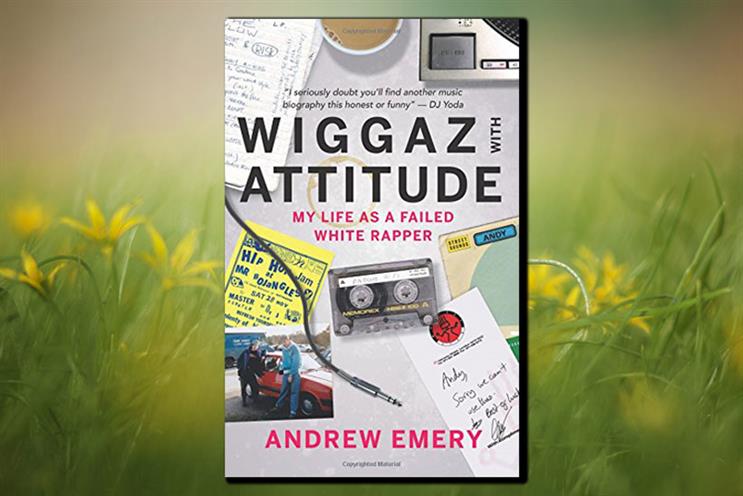7/10
Reviewed by Andy Bolter, creative partner, Yes&Pepper
Wiggaz with attitude: My life as a failed white rapper by Andrew Emery
Published by Fat Lace Publishing
Rapping into a hairbrush, breakdancing on the kitchen floor, carrying around the world's smallest, quietest ghetto-blaster: in 1980s Britain, long before the world had heard of Eminem, how does an aspiring white teenage rapper keep going in the face of universal ridicule? Hip hop, 80s Britain and the underdog from Bingham, a small market town in Nottinghamshire. This, I hoped, was going to be a story of legend.
I think most of us are drawn to people that reach for the implausible dream. It gives us hope. And if Andrew Emery aka Drew Huge, Kold Kid E, MC Melody Ski, as he wanted to be known throughout his formative years, was going to make it as a white teenage rapper, then I was in for a treat from the street.
The truth is, this book is a lot less about learning from struggle and failure, and more about how a growing group of fans was inspired by a lifestyle to not only change their clothes and their musical taste but also their way of thinking
First things first. There are parts of this book that made me laugh out loud, and there were parts (especially in the first third) that transported me back to the 80s faster than Southend’s fastest train to London. But unless you love your hip-hop, and it turns out I don’t, then this book can get bogged down with the gun totin’, bitch slappin’, street struttin’ machismo history of hip hop, leaving you yearning for Emery’s very own ‘8 Mile’.
But then again, how could the writer explain how this culture – from a New York that back in the 80s may as well have been another planet – changed the way he looked at life?
After borrowing a couple of vinyl LPs Electro 1 and 2 from a kid at school, Andrew’s life changed forever. We relive his days searching for any hip hop he could get his ears on, from waiting patiently for John Peel to play one to befriending new friends with a shared love for this new sound (there were very few of them), to hanging about in record shops (there were even fewer of those). This book follows Emery from discovery to being part of his first crew, Prehistoric Ages, to recording demos and even playing live. All to derision and polite excuses. All against a backdrop of a family break up, changing schools, new friendships, girls and growing up.
The book does finish fairly abruptly once he leaves university. Emery happily acknowledges his career as a rapper flopped through a lack of talent, which is core to the light-hearted joy of this read, but he does try to take a deeper look at racism within a world that has travelled from the Bronx to Bingham and beyond.
The truth is, this book is a lot less about learning from struggle and failure, and more about how a growing group of fans was inspired by a lifestyle to not only change their clothes and their musical taste but also their way of thinking. A love that most brands can only dream of enjoying. And when you’re heart deep into something like this… is failure even possible?
True love and happiness can only be found in the doing, not the success. And ultimately, that’s the ‘break’ of this story that needs repeating.
Key takeouts
- It’s very funny. Laugh out loud during rush hour funny.
- The book covers a good mix of hip hop history and 80s small town living
- Go beyond the fun, the 80s and hip hop and there’s a life lesson we should always embrace… love what you do, not the result it gives you.


